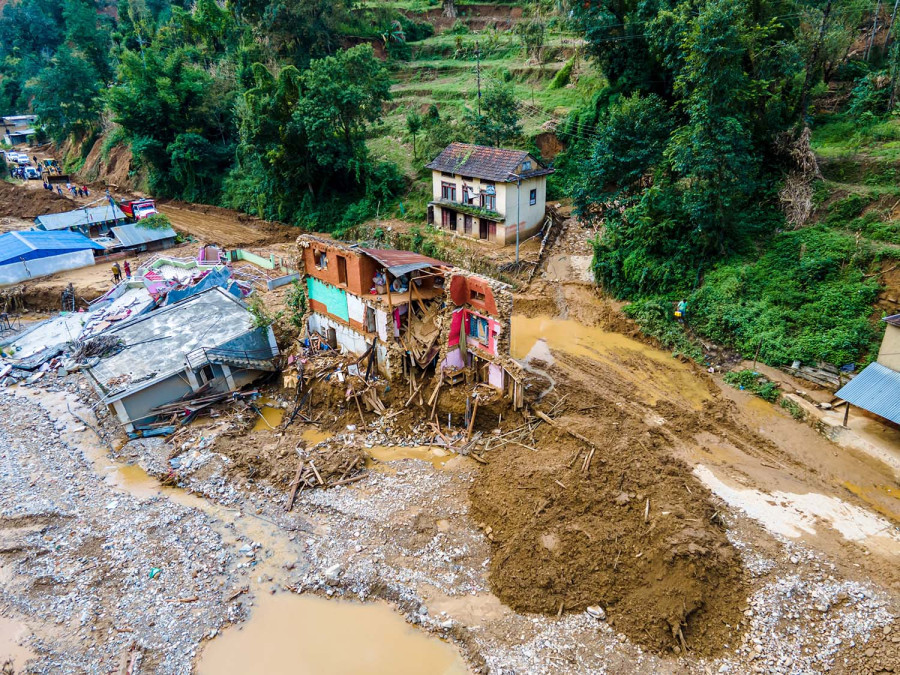Money
Nepal’s economy to grow over 4 percent amid reconstruction efforts, says IMF
Fund pledges $40.6 million in financing, citing progress under Extended Credit Facility.
Post Report
The International Monetary Fund said on Wednesday that Nepal’s economy is expected to grow at a pace exceeding 4 percent in the current fiscal year, primarily supported by substantial public capital expenditure, including post-flood recovery and reconstruction efforts.
The IMF has trimmed the World Bank’s growth forecast following the damage caused by the late September floods. In October, the World Bank had projected 5.1 percent growth for this fiscal year.
The heavy rainfall in late September last year caused floods and landslides in most parts of the country, resulting in a loss of Rs46.68 billion for the economy.
According to the loss and damage assessment report of the National Disaster Risk Reduction and Management Authority under the home ministry, the floods and landslides from September 26 to 28 caused significant damage to the physical infrastructure sector, followed by the social and productive sectors.
Kathmandu experienced its highest rainfall on record, surpassing previous measurements set in 2002. The Tribhuvan International Airport station recorded 239.7 millimetres of rain, highlighting the intensity of the weather system affecting the region.
More than 83 percent of the total economic losses were observed in the physical infrastructures, amounting to Rs38.92 billion.
The report said 41 roads and highways were damaged. The estimated cost of repairing and maintaining these infrastructures is Rs27.98 billion.
Blocked or damaged roads hinder transporta and supply chains, complicating relief efforts and economic recovery.
The IMF said that the severe floods disrupted Nepal’s economic recovery, which began in 2023-24.
These floods caused widespread damage across critical sectors and further dampened the still-weak domestic demand.
In December 2024, inflation accelerated to 6.1 percent due to a spike in food prices following the floods. Robust remittances and subdued imports strengthened Nepal's external position.
Accordingly, revenue growth remained modest. Amid the ongoing correction from the post-pandemic credit boom, vulnerabilities in the financial sector are increasing.
The IMF said that the banking sector’s non-performing loans reached 4.4 percent of the total in October 2024, and the financial health of the savings and credit cooperatives sector is deteriorating.
The IMF team led by Sarwat Jahan visited Kathmandu from January 8 to January 19.
Nepal’s authorities and the IMF team have finalised a staff-level agreement for the fifth review of the country’s economic reforms, backed by the IMF’s Extended Credit Facility (ECF) arrangement.
The staff-level agreement is subject to approval by the IMF Executive Board, giving Nepal access to about $40.6 million in financing. This will bring the total IMF financial support disbursed under the ECF to about $283.9 million.
The IMF issued a statement: “Following disruptions from recent floods, the recovery is expected to strengthen in the second half of the current fiscal year 2024-25, supported by stronger public capital expenditure, including post-flood recovery and reconstruction efforts.”
The IMF said Nepali authorities are progressing on key structural reforms to improve the anti-money laundering framework, reduce fiscal risks, and strengthen the financial sector.
Nepal continues to make progress with the implementation of the ECF-supported programme.
“Programme performance was satisfactory, with all quantitative performance criteria and indicative targets for July 2024 met except for the indicative targets on revenue collection and child welfare grants,” the IMF said.
It said the implementation of structural benchmarks, due before December 2024, gained momentum, and reforms in some areas are still ongoing.
Key reforms accomplished as part of the fifth review include amending Nepal’s anti-money laundering (AML) law, strengthening the financial oversight of public enterprises, and completing an audit of the 2023-24 financial statement of the Nepal Rastra Bank (NRB) involving international experts.
Despite cancelling the initial procurement for the Loan Portfolio Review (LPR) of the 10 largest banks, Nepal’s central bank remains committed to completing the review. It has restarted hiring an independent international consultant to assist with the review.
The IMF expects imports to rebound in the second half of the fiscal year. Flood-driven food inflation is expected to ease as transport networks are repaired and agricultural output recovers, improving the food supply.
However, the outlook is subject to important downside risks, including under-execution of growth-enhancing capital projects, increased financial sector vulnerabilities, and potential disruption to policy continuity and reform implementation.
“Against this background, policies and reforms envisaged under the ECF-supported programme remain well-placed to help preserve macroeconomic stability and strengthen Nepal’s policy framework. Growth-friendly fiscal consolidation—accelerating capital expenditure and stronger revenue mobilisation—is critical to boosting sustainable and inclusive economic growth,” according to the IMF.
Timely execution of spending will further support this effort. Monetary policy should follow a data-driven approach to maintain price and external stability while supporting growth.
With amendments to the AML Law enacted, the next steps would be to focus on the effectiveness and application of the new legal framework. Amendments to the Nepal Rastra Bank Act are key to strengthening the central bank’s independence and governance.
“Rising financial sector vulnerabilities warrant increased vigilance. In this context, promptly launching the Loan Portfolio Review of banks is essential. Prioritising measures to deal with problematic cooperatives would help boost consumption,” the IMF statement reads.




 10.12°C Kathmandu
10.12°C Kathmandu













